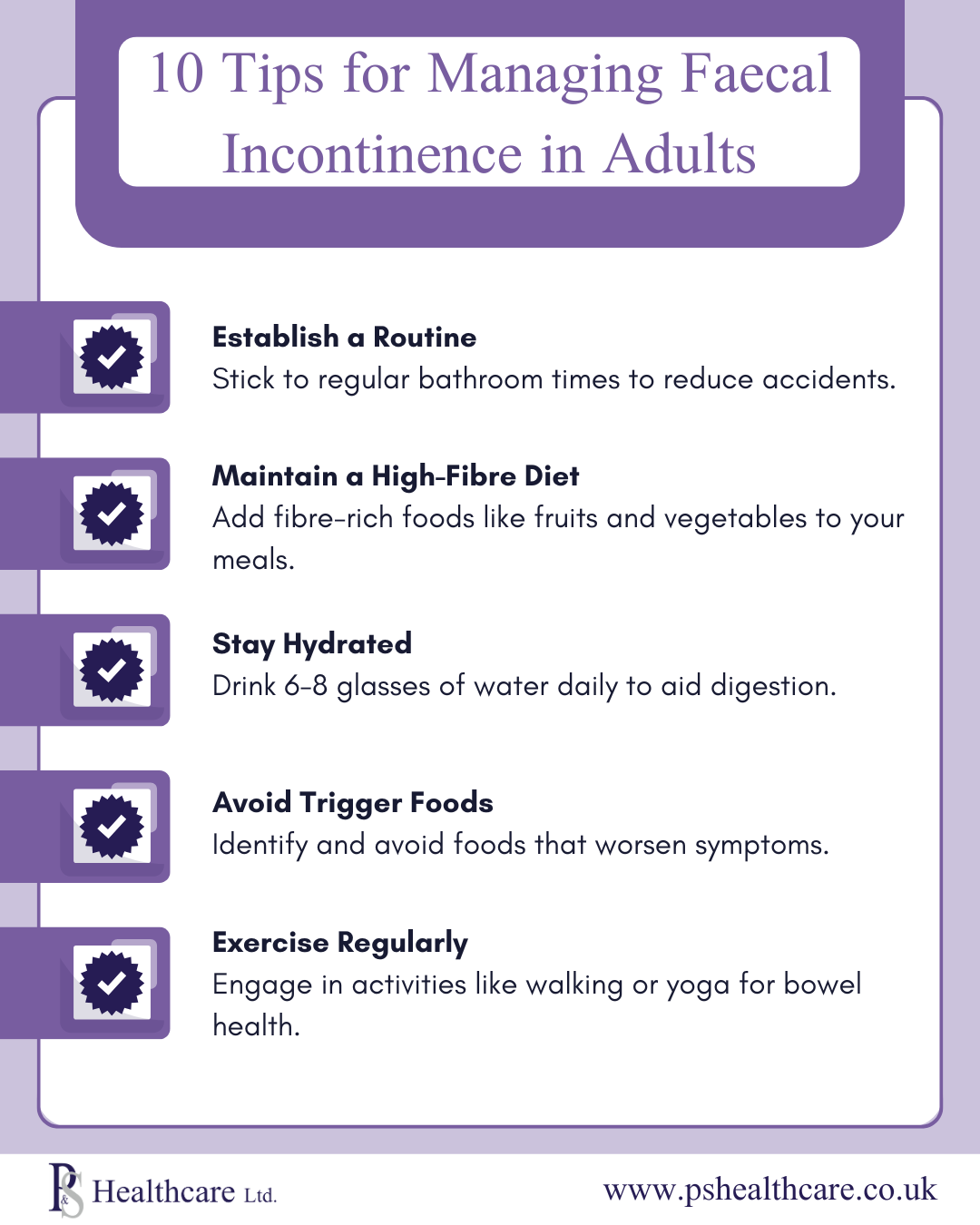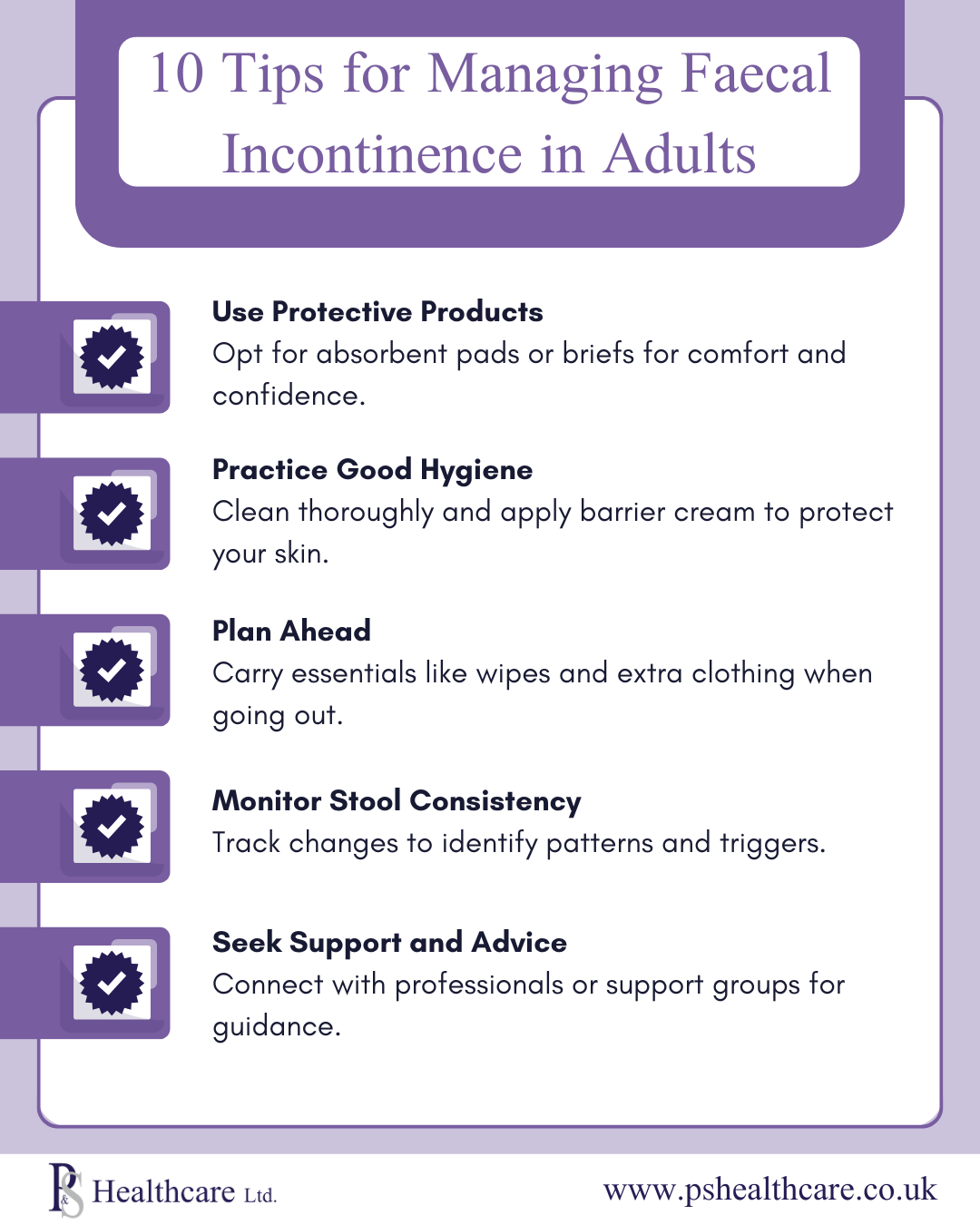10 Tips for Managing Faecal Incontinence in Adults

Faecal incontinence, the inability to control bowel movements, can be a challenging condition for many adults. However, with the right strategies and adjustments, it is possible to manage the condition effectively and improve quality of life. Here are ten practical tips to help manage faecal incontinence:
1. Establish a Routine
Creating a regular schedule for bowel movements can help reduce the risk of accidents. Try to visit the bathroom at the same times each day, particularly after meals when the digestive system is most active.
2. Maintain a High-Fibre Diet
A diet rich in fibre can help regulate bowel movements by adding bulk to stools. Incorporate whole grains, fruits, vegetables, and legumes into your meals. However, introduce fibre gradually to avoid bloating or discomfort.
3. Stay Hydrated
Drinking enough water is crucial for digestive health. Adequate hydration helps prevent constipation, which can exacerbate faecal incontinence. Aim for 6-8 glasses of water daily, unless advised otherwise by a healthcare professional.
4. Avoid Trigger Foods
Certain foods can irritate the digestive system or cause loose stools. Common culprits include spicy foods, caffeine, alcohol, and high fat or greasy meals. Monitor your diet to identify and avoid foods that worsen symptoms.
5. Exercise Regularly
Physical activity can promote healthy digestion and improve bowel regularity. Low-impact exercises, such as walking, swimming, or yoga, can be particularly beneficial. Pelvic floor exercises, in particular, may strengthen the muscles that support bowel control.
6. Use Protective Products
Modern incontinence products, such as our absorbent briefs, are discreet and designed to manage accidents effectively. Look at our range of products that offer both comfort and reliable protection.
7. Practice Good Hygiene
Proper hygiene can prevent skin irritation or infection. Clean the area thoroughly after each episode, using gentle, unscented wipes or a warm washcloth. Apply a barrier cream to protect the skin from irritation.
8. Plan Ahead
When leaving the house, be prepared by carrying spare incontinence products, wipes, and a change of clothing. Familiarise yourself with the locations of nearby restrooms to reduce anxiety while in public.
9. Monitor Stool Consistency
Keep track of changes in stool consistency, as this can provide insight into dietary or lifestyle adjustments that may be needed. Tools like a food diary can help identify patterns and triggers.
10. Seek Support and Advice
Managing faecal incontinence can be emotionally challenging. Reach out to support groups or trusted individuals to share your experiences. Additionally, consulting with a healthcare professional, such as a dietitian or physiotherapist, can provide tailored guidance and support.
While faecal incontinence can feel isolating, it is a common condition with practical solutions. By making lifestyle adjustments and adopting effective management strategies, you can regain confidence and improve daily living. Remember, small changes can make a big difference in managing the condition and enhancing your overall wellbeing.
Download our useful infographic below:


More News:
- 10 Tips for Talking to Your Child About Bedwetting
- 10 Things You Should Know About Postpartum Incontinence
- 10 Common Triggers of Urinary Incontinence in Women Over 50
- 10 Tips for Night-Time Incontinence Management in Adults
- 10 Ways to Manage Incontinence While Playing Sports
- 10 Tips for Managing Faecal Incontinence in Adults
- 10 Lifestyle Changes to Manage Urinary Incontinence Symptoms
- 10 Ways to Manage Urinary Incontinence During Pregnancy
- 10 Causes of Urinary Incontinence in Men and How to Treat Them
- 10 Practical Solutions for Coping with Incontinence at Work
- 10 Myths About Menopause and Incontinence You Should Stop Believing
- 10 Foods to Avoid to Prevent Bladder Irritation and Incontinence
- 10 Effective Pelvic Floor Exercises for Urinary Incontinence
- 10 Common Causes of Bedwetting in Children and How to Address Them
- Causes of Faecal Incontinence
- Breaking the Silence: Managing Incontinence with Confidence
- Supporting Loved Ones with Incontinence: A Caregiver's Guide
- Top 10 Tips for Managing Incontinence Comfortably This Christmas
- Pregnancy and Postpartum Incontinence: Prevention and Recovery
- 10 Random Facts About Pee You Probably Didn't Know
- Diet and Bladder Health: Foods That Help and Hurt
- Helping Your Child Manage Incontinence: A Parent's Resource
- The Most Common Bladder Control Problems and How to Manage Them
- 10 Things That Can Make Incontinence Worse
- Incontinence Myths vs Facts - Dispelling Common Misconceptions
- Top 10 tips to help with bladder control during pregnancy
- 10 Effective Ways to Stop Bladder Leaks & Manage Incontinence
- P&S Washable Face Mask with ViralOff
- New Product For Men - The Slip Brief
- New Monthly Protection Briefs For Women
- New Product - The OooPS Pant for Stress Incontinence
- New Adult Inco-elite Range Launched
- EMDA WOMEN OF WORTH AWARD 2009
- New Website Launched
- New Website Under Development

